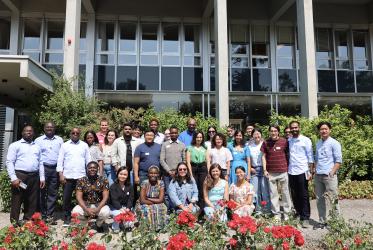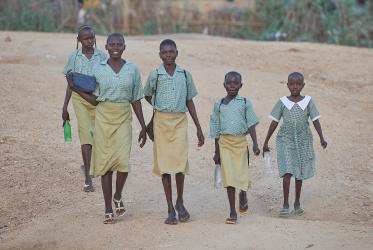It was a warm August day and I was on my way to Taizé. I was looking forward to going to the community in France that was already close to my heart. As a young adult I participated in many Taizé worship services organized by local churches where I lived in Canada. We sang the beautiful chants that Taizé is so well known for: “Come and fill our hearts with your peace…” For me, these services were a refuge for the soul.
But this trip to France was not the one I had hoped to make for my initial visit to the Taizé community. It was August 2005. I along with two other colleagues from the WCC travelled to Taizé for Brother Roger’s funeral.
Brother Roger was born in Switzerland in 1915. During World War II, Brother Roger and his sister Geneviève bought a house in the village of Taizé where they sheltered refugees fleeing the war. Since he was young, Brother Roger held the conviction that: “a life of community could be a sign that God is love, and love alone.” He founded the community of brothers known as Taizé that gradually grew into the monastic, ecumenical community that it is today consisting of over a hundred brothers from around the world.
Brother Roger’s life ended tragically ten years ago when he was stabbed during a worship service by a young woman who was mentally ill. I was convinced this violent incident would change the character of Taizé, that the brothers would put up bulletproof glass between themselves and the visitors or that people would have to run their bags through x-ray machines upon arrival.
But this was not the case. The community of brothers continued to welcome pilgrims with openness and care.
In a world that is hyper-militarized, the brothers modeled a different response – one of trust, prayerfulness and compassion in a desperately wounded world. Taizé continues to organize what is called a “Pilgrimage of Trust” in different cities around the world each year where thousands of pilgrims are welcomed into people’s homes and churches.
Why is this place so special? Why does it continue to attract so many pilgrims? I believe Taizé is what the Celts referred to as a “thin place” where the veil between this reality and God is permeable. A thin place is where we may feel deeply connected to those who have gone before us – those who found refuge, celebrated, cried and prayed together in that very place.
There is little separating us from God in a place like this. We deepen into our own souls and may find a sense of home and belonging.
The theology of Taizé is simple but profound. It is one of love, acceptance, justice, wholeness and peace.
At Taizé, a large bell rings three times during the day gathering us together for contemplative worship in the “Church of Reconciliation.” The staple components of the worship are song, prayer, scripture and silence. There, surrounded by hundreds of worshippers singing the chants, we enter deeper into prayer.
If you don’t feel like singing, everyone around carries you in song. We pray and sing in different languages and there is a beautiful cacophony of voices.
The brothers model a life of simplicity and humility. We take off our shoes and sit on the floor of the church. In the morning there is bible study in small groups and workshops in the afternoon lead by the brothers.
We eat simple meals and sleep in simple dorm rooms. Everyone participates by volunteering to do dishes, serve the meal, or clean up the site. People are invited to come as they are and participate as they can. There is richness in this simplicity.
This environment, this community gently urges us to let go of distractions that do not serve us. We are invited to surrender to an ever deepening knowing of the love and peace of God.
Today, Taizé continues to welcome thousands of people each year, many of them youth. A group of young people from Geneva (Pastorale des Jeunes de Genève) are making the journey to Taizé by foot this August for an opportunity to “renew an inner spiritual life and search for solidarity.”
Taizé is holding special events to search for a “new solidarity” to remember the remarkable life of Brother Roger and celebrate the 75th anniversary of the community.







